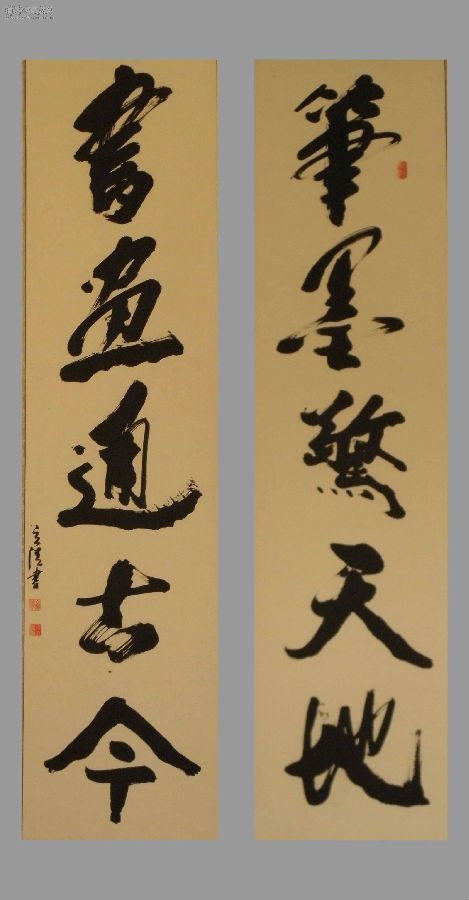(单词翻译:单击)
Duilian or Chinese Couplets
对联
Duilian (Chinese couplets written on scrolls, etc. or a pair of scrolls containing a poetic couplet), also known as ying lian (pillar couplets) or dui zi (antithetical couplets), is a unique literary genre in China.
对联,雅称楹联,俗称对子,是中国一种独特的文学艺术形式。
Generally speaking, duilian can be classified into Spring Festival (Chinese New Year) couplets, wedding couplets, longevity couplets, elegiac couplets, decorative couplets, trade couplets, social couplets, and miscellaneous couplets including facetious or humorous couplets.
对联的种类分为春联、喜联、寿联、挽联、装饰联、行业联、交际联和杂联(包括谐 趣联)等等。
Couplets can be long or short. The shortest one contains one or two characters, and the longest one several hundred characters, which can be seen on ancient Chinese architecture.
对联句式比较灵活,可长可短,伸缩自如。短的仅一两个字,长的可达几百字。在我国古建筑中,甚至还有多达数百字的长联。
The structure of the couplets can be zheng dui (parallel in meaning), fan dui (antithetical in meaning), liushui dui (same meaning expressed in two sentences, e. g. a couplet), and jijv dui (a couplet made of two lines from different poets), etc.
对联形式多样,有正对、 反对、流水对、联珠对、集句对等。
Duilian developed from antithesis or antithetical parallelism of lvshi, or regulated verse, a poem of eight lines, each containing five or seven characters, with a strict tonal pattern and rhyme scheme. Therefore it contains some of the characteristics of this special poetic form.
对联是由律诗的对偶句发展而来的,它保留着律诗的某些特点。
A couplet must have the following features: one, each line having an equal number of characters, and the same sense groups;
对联必须具备以下特点:一要字数相等,断句一致;
two, strictly adhering to the tonal patterns, e. g. level tone versus oblique tone;
二要平仄相合,音调和谐;
three, characters of the same part of speech having to be used, and in the same position, that is, function words versus function words and content words versus content words. In other words, it should be nouns versus nouns, verbs versus verbs,adjectives versus adjectives, numerals versus numerals, adverbs versus adverbs, and that characters of corresponding parts of speech in either line should be in the same position;
三要词性相对,位置相同,一般称为“虚对虚,实对实”,就是名词对名词,动词对动词,形容词对形容词,数量词对数量词,副词对副词,而且相对的词必须在相同的位置上;
four, the interconnection of the contents. The meaning of the first line should be interrelated to that of the second, yet the two sentences must not have the same meaning.
四要内容相关,上下衔接,上下联的含义必须相互衔接,但又不能重复。
As for pasted or hung couplets, it is a tradition to write them vertically and when pasted or hung, the first line should always be on the right and the second on the left, not the other way round.
此外,张挂的对联,传统做法还必须直写竖贴,自右而左,由上而下,不能颠倒。
Another thing, closely related to the couplet, is called heng pi, a horizontal scroll bearing an in-scription, or horizontal plaque, which is in fact the title or theme of the couplet.
与对联密相关的横批,可以说是对联的题目,也是对联的中心。
A good heng pi adds the finishing touch to the couplet.
好的横批在对联中可以起到画龙点睛的作用。
Whether it is to chant things to express one’s aspirations or describe the scenery to give vent to one’s feelings, the writer is expected to be very good at summarization, and proficient in Chinese so as to produce a couplet in a few characters, which is excellent in both content and language, full of aesthetic beauty, and thought-provoking.
对联无论是咏物言志,还是写景抒情,都要求作者有较高的概括力与驾驭文字的本领,才可能以寥寥数语,做到文情并茂,形神兼备,给人以思想和艺术的感受。
With the cultural exchanges among different countries, duilian or Chinese couplets began to spread to Vietnam, Korea, Japan, and Singapore. And the custom of pasting Spring Festival couplets during the New Year is observed in these countries as well.
随着各国文化交流的发展,对联还传入越南、朝鲜、韩国、日本、新加坡等国。这些国家有的地方至今还保留着贴对联的风俗。


